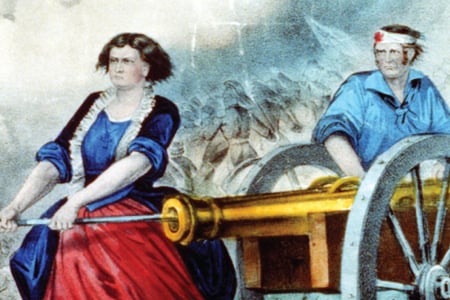The legend of Molly Pitcher
If the exploits of this courageous Monmouth lady aren’t literal fact, well, they ought to be!

Talk to a professional historian about Revolutionary War heroine Molly Pitcher, and you may draw a skeptical smile. True, amateurs will shower you with detail about this famous patriot—contending that her real name was Mary Ludwig Hays McCauley, that she was born in Trenton in 1744 and died in Carlisle, Pa., on January 22, 1832, and even that she “often cursed like a soldier”—but some pros privately suspect she may actually be a composite of several women, or even a fanciful bit of folklore. No matter. Molly’s is a famous story, and it belongs to Monmouth County.
In effect, there were really three sides in the hard-fought Battle of Monmouth on June 28, 1778: the British, the Americans and the heat. Imagine yourself in that sweltering fracas, wearing the thick wool uniforms of the time, contending with the enemy and with temperatures that reportedly reached triple digits. (As for the humidity, precise records are mercifully missing.) Is it any wonder that the most celebrated participant in the day’s events (give or take General George W.) was the woman—or women—who brought refreshing pitchers of water to the troops? As the tale has it, Molly then took a soldier’s place at a cannon when he fell, continuing to “swab and load” until by day’s end she’d earned General Washington’s admiration and the lifelong nickname “Sergeant Molly.”
Fictional or not, Molly Pitcher has had her name printed on a postage stamp, has had a World War II Liberty ship christened in her honor, and has also given her moniker to a Red Bank hostelry, the Molly Pitcher Inn, where you can raise a glass or lay your head.
Historians consider the Battle of Monmouth a British victory from a tactical standpoint. But it proved for the first time that the Continental Army—having drilled hard during the Valley Forge winter under Baron von Steuben and the Marquis de Lafayette—could now stand up to the rigors of a confrontation with the mighty Redcoats. And the British, under General Sir Henry Clinton, withdrew at midnight to resume their march toward New York City.
(Of course, whatever military experts say, historians of film know the wisdom of an editor’s mantra in a well-known movie by director John Ford: “When the legend becomes fact, print the legend.”)

